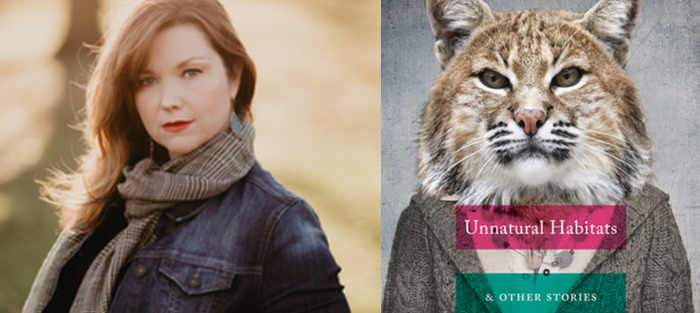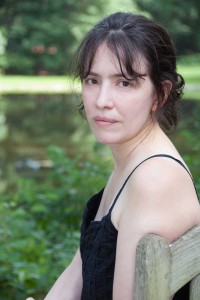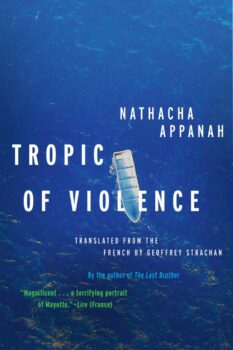In her powerful debut collection, Unnatural Habitats & Other Stories (WTAW Press), Angela Mitchell isn’t afraid to write about characters whose choices might make readers cringe. In the first story, “Animal Lovers,” we find the main character Dee walking her troublesome dogs, who manage to topple her while chasing a chipmunk and then escape. Mitchell writes about Dee and her pets: “Traffic was heavy on Garland and, as she lay in the grass and dirt, she hoped they might get hit.” Though surprising, Dee’s reaction rings true. She does not go after the dogs.
But that is not all there is to Dee. Throughout the book, Mitchell has written layered protagonists who are more than their transgressions. Many are poor, struggling, or with complicated families. Each story presents a compelling situation; suspense makes it impossible to turn away. If in the end if we are disappointed in the characters, we are not disappointed in the stories, which capture the struggle we all face when self-interest conflicts with decency.
“Animal Lovers” was awarded Colorado Review’s Nelligan Prize for Short Fiction and given special mention in The Pushcart Prize XXXV. Mitchell’s flash fiction was recently selected for inclusion in The Best Small Fictions 2018. A former Tennessee Williams Scholar at the Sewanee Writers’ Conference, she is Director of the St. Louis Writers Workshop and Associate Fiction Editor of december magazine. She earned her MFA in Creative Writing from the University of Missouri-St. Louis. An eighth generation native of the Ozarks of southern Missouri, she now lives in St. Louis with her husband and sons.
Interview:
R.L. Maizes: The characters in your stories are often unlikeable but always fascinating. They abandon people in need, including children, and they can be murderously violent. Have you gotten pushback, when you were an MFA student or from editors or readers, to writing unlikeable characters?
Angela Mitchell: I haven’t had a lot of pushback in workshops, but I know there have been readers at journals and presses that have struggled with them. I’ve received notes from readers who expressed a desire for a happy ending or who were uncomfortable with, say, the sexual appetites of a character that didn’t fit their ideal. I do think that, sometimes, there have been people who have read my work and had one set of ideas about me, as a person, and were very much taken aback when they met me and found I’m generally nothing like the characters I write.
I wonder if all fiction writers struggle with readers thinking they’re writing about themselves, as if all stories are personal essays rather than fiction. Especially if the story is narrated in first person—like your marvelous story “Not from Here”—or when the point of view is third-person close and the character is the same gender as the writer. To confuse matters further, there are writers who draw heavily on autobiographical material. I’m thinking of Pat Conroy in The Great Santini, for example, or in the extreme, Pam Houston’s fiction which she described in a wtaw interview as “coming in at 82% true.” But that leads me to the question, if the characters in Unnatural Habitats are nothing like you, where do they come from?
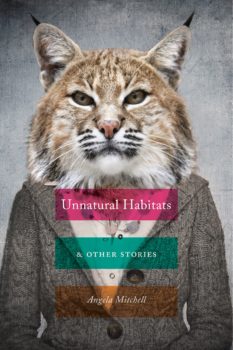 I think it’s so common for readers to assume that what’s on the page is lifted, verbatim, from a real-life situation. And I get it. I understand that it might be hard to conceive of the idea that a story, a work of fiction, can emerge from a patchwork of life experiences or observations to create something wholly new and unique and of its own making. Fiction writing is weird, when you think about it—the notion that a person sits down and begins spinning a tale that feels real and, at its best, is based in a greater truth, but is its own invention. Of course, you’re right to point out that a lot of writing is autobiographical, so why wouldn’t all of it be? That’s the beauty of fiction, though, that it flows between the autobiographical to the fully imaginative, the mythological. Yet, when it’s right, all of it resonates in our consciousness as utterly authentic.
I think it’s so common for readers to assume that what’s on the page is lifted, verbatim, from a real-life situation. And I get it. I understand that it might be hard to conceive of the idea that a story, a work of fiction, can emerge from a patchwork of life experiences or observations to create something wholly new and unique and of its own making. Fiction writing is weird, when you think about it—the notion that a person sits down and begins spinning a tale that feels real and, at its best, is based in a greater truth, but is its own invention. Of course, you’re right to point out that a lot of writing is autobiographical, so why wouldn’t all of it be? That’s the beauty of fiction, though, that it flows between the autobiographical to the fully imaginative, the mythological. Yet, when it’s right, all of it resonates in our consciousness as utterly authentic.
So, in answering this question, I realize I’m not being completely honest about my characters. There is one very minor character that is me—very much me, when I was a girl—and, recently, a friend read the collection and immediately texted me to say that she saw me in the story “Deeds.” I asked her what she meant and she said, “You wrote yourself into that one. You wrote yourself in as Garnet.” That surprised me so much because Garnet, the story’s main character, is modeled on my father. Garnet moves and talks and thinks and even runs like my dad, so it felt like my friend had recognized something very personal, very intimate there that I had not consciously intended. I am, in many ways, quite a lot like my dad. Other characters, though, are born from the many, many people who have been a part of my life over the years, people I worked with or met at school or heard about through friends. I’ve collected their stories both in idea journals and then carried them around in my head until I was ready to remake them in a way that worked within the structure of a story.
Two of the themes in the book are poverty and jealousy. Characters struggle to survive while observing others who have more than enough, conditions that lead to unfortunate choices. Yet, I didn’t find the stories heavy handed or moralistic, which to me would be the death of a story. Were you conscious of avoiding moralizing? Were there specific techniques you used to avoid it?
My goal when I’m writing is to keep everything as real and hard and authentic as I can, and that means not getting sappy or sentimental with characters, even if I might feel deeply sorry for them if I knew them in real life. I think that moralizing could very easily grow out of sentimentality, so I avoid it as best I can. Take the character of Libby, for example, who is a teenager growing up with a not-so-great dad, in a run-down house miles outside of the nearest town. She has a sweetness about her and all she wants is to have something nice for herself, which she absolutely deserves, but to draw her in a way that wouldn’t be off-putting to a discriminating reader, I really had to resist making her sound too pitiful, too perfectly sad, despite her circumstances. I had to give her envy and just enough self-doubt to get her into trouble. She’s a better character for being imperfect.
I found Libby very sympathetic, and as you say authentic and unsentimental. One moment that stands out for me is when she touches everything in her rich classmate’s bathroom. By focusing on her actions rather than her feelings, you avoided sentimentality, while perfectly portraying her envy and poverty. Another sentence I found myself underlining was your description of Libby as “curious” about how her classmate “got to live in one kind of way and I got to live in another.” Showing Libby as thoughtful, rather than as sorry for herself, was another unsentimental choice. It’s my experience that writing that is unsentimental can more effectively trigger sympathy in the reader. Would you agree? Were there other tools you used to generate sympathy for the “real and hard and authentic” characters that populate the book?
I absolutely agree. You can’t tell a reader how to feel, and fiction that attempts to do so is fiction that will more than likely leave a reader feeling manipulated, rather than emotionally or intellectually transformed. But generating sympathy for some of my less-likable characters wasn’t necessarily easy. I’ll use Layton Vines, a character in “Animal Lovers” and “Retreat,” as well as the main protagonist in the title story, as an example of this type of challenge. Really, Layton is just despicable in so many ways and, if I knew him in real life, I’d think, “There’s a man who’s earned a good ass-kicking.” So, to give him depth, I granted him three gifts: a wife who legitimately wants to make a good life with him; a teenage son who wants to find a connection with him; and parents who are decent and loving people and who, despite all his failings, love their son unconditionally. Layton is surrounded by opportunities for grace. When I think about it, that’s what I usually try to provide for all of my characters, a door or a window that offers access to a better way, to something more honorable or genuine, but whether or not they take advantage of it is what shapes the outcome of the story.
There are moments in the stories when women and girls realize the limits of their power, their essential helplessness, against men in their lives. I found these moments very moving. What was it like to write them? What inspired you?
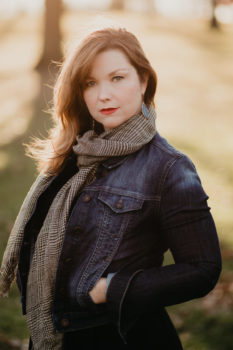 To write those moments, I drew so much from my memories of watching girls and women throughout my life be abused, sometimes in ways so subtle that no one even took notice. I grew up in a place where it seemed awfully easy for girls to slip into a very subservient role to boys, and that often played out in the form of sexual promiscuity. Of course, the boys were seen as heroes, praised for their virility, and the girls were dismissed as sluts. When we started having a public discourse as part of the #MeToo movement, I realized how much of what I watched and personally experienced (to a far lesser degree than most girls I knew) was a part of the general devaluing of girls and women we all know about. Writing those experiences, in some ways, was something I had needed to do for a long time, a way of calling out the cruelty.
To write those moments, I drew so much from my memories of watching girls and women throughout my life be abused, sometimes in ways so subtle that no one even took notice. I grew up in a place where it seemed awfully easy for girls to slip into a very subservient role to boys, and that often played out in the form of sexual promiscuity. Of course, the boys were seen as heroes, praised for their virility, and the girls were dismissed as sluts. When we started having a public discourse as part of the #MeToo movement, I realized how much of what I watched and personally experienced (to a far lesser degree than most girls I knew) was a part of the general devaluing of girls and women we all know about. Writing those experiences, in some ways, was something I had needed to do for a long time, a way of calling out the cruelty.
Personal testimony is the heart of the #MeToo movement, but your book shows the role that fiction can play, too, with its freedom to explore power dynamics between men and women in various settings. You say you needed to write about this for a long time. What was holding you back?
I had to find my own sense of bravery and, for whatever reason, I sort of lost my nerve in college and then throughout my twenties, and writing fiction, as you know, takes no small amount of gumption. I suspect this happens to a lot of young women—we lose our nerve a bit as we fully enter into adulthood, when we’re first presented with the challenge of making our own way in the world. It’s both a heady and frightening time. Flash forward a few years to when I gave birth to my oldest son and decided to step out of my career in college administration and stay at home with him (this was mostly because, like so many women in America, the childcare I wanted would’ve eaten up my entire paycheck). My son and I had a difficult time during his birth and, in the year to follow, I would be challenged, physically and mentally, by motherhood in a way I had not anticipated. But I lived to tell the tale. Whatever fear had been holding me back from trying to learn how to write fiction left me, and I was free to try and fail as much as I needed to.
It felt to me like the stories work to reveal the characters as they are and to downplay the possibility of change. From the outset, we see a certain stuckness in the characters. Was that your intent? Does it reveal something you think is true about people and their ability to change?
Everyone has the ability to change, but, to be honest, it’s very, very hard, and I don’t think we always have the gumption to actually do it. It’s why people stay in bad marriages and bad jobs and bad situations, in general, because getting up the energy to change is difficult and, sometimes, it simply isn’t worth the risk. So, yes, I do see a number of my characters as sort of “stuck,” but I also see them trying to figure it out, just not very well. With a character like Dee, one who has been married, then divorced, then in a strange, romantic relationship with one of her bosses, she’s moving and pushing and writhing within her life, but not necessarily moving in a forward direction. And isn’t that the case for a lot of us in this life? Recently, a friend was talking about the problem of ending a poor marriage and he said it was really hard to just “parachute off a moving train.” That’s absolutely true and it’s so often why we don’t. But even the struggle of that can make for a good story.
Yes, I think you’re right. All kinds of changes are hard and character change is especially hard, maybe impossible for some. Speaking of change, and to switch subjects a bit, in what ways has your writing changed over the years? You’re the Director of the St. Louis Writers Workshop and the Associate Fiction Editor of december magazine. How have those roles impacted your writing?
I definitely see writing now more as a product of work ethic and ambition than I do talent. That’s a mistake a lot of beginning writers make, believing you have to be touched by the gods to write and, somehow, they have to figure out if they’re one of the chosen before they begin. Of course, some talent is necessary—a knack for keen observation, an affinity for description, a natural ear for dialogue—but it’s of no use at all without the willingness to simply put in the labor. I’ve known many very good writers over the years, ones I would say were naturally more talented than me, who just sort of fell off, who never produced. They could’ve, but they didn’t and, as a result, you’ll never read their work, never know their names. At the workshop, I try to help knock that notion that talent is the end-all right out of people, and, sometimes, they’re a little shocked or even disturbed to hear my take. But the ones who really want to write are comforted by it and settle in and get to work. As a reader for december, it’s sort of apparent when a writer just hasn’t put in the time and effort a piece really needs to be better. When I read, I want to feel the force of the writer’s desire to tell that story; if I sense that passion there, I can forgive all sorts of tiny errors or minor stumbles. But when it’s missing, I’m terribly disappointed.
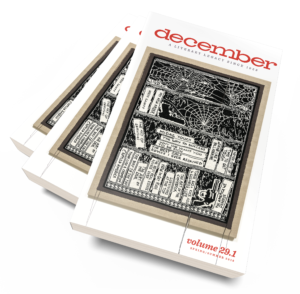 Based on your role as Associate Fiction Editor of december magazine, what is some advice you would give to writers who are submitting to literary magazines?
Based on your role as Associate Fiction Editor of december magazine, what is some advice you would give to writers who are submitting to literary magazines?
My biggest recommendation is to make certain that your story not only has great characters, but that there is also something actually going on. Characters have to get into trouble and that trouble creates the action. In literary fiction, we put plot on the back burner and that’s fine with me—I love literary fiction above all other forms—but, still, a piece of fiction needs to be more than a meditation. We have to see some kind of transformation take place for the characters. Too many stories come through that lack this and I find myself stepping away and having no idea what happened. That’s often because nothing really did.
I read that you sometimes find character names in graveyards and that you also found what you thought would be a great character name on a road sign for a real estate agent named Rebel Cook. This made me wonder if as a writer you experience a kind of dual life, living something and thinking about writing about it at the same time. I know I do. It can be distracting. I’ll e-mail myself about what I’m observing so I can put it aside and return to living the experience.
Yes, it’s so distracting! I have the annoying habit of remembering more details for a story than I can for something in real life (like, say, my taxes). I’ve also had the situation of writing a story and then remembering it as a real event, rather than the piece of fiction that it is. That’s kind of embarrassing and it definitely makes non-writers look at you twice. But I love that dual-living that we do, of being in two places at once. It feels magical, though I also think it can make me come off as sort of dreamy and distant when I’m in the midst of it. The best defense against it for me is to try to write things out first thing in the morning, then maybe write down a thought or two at night to empty out my head, and try to go on from there and be an attentive friend and colleague and parent. But it’s tough to do that, to leave the fictional world behind.
I understand you’re working on a novel. In what ways is the novel similar to your stories? In what ways is it different? In what ways is your writing process different when working on longer work?
Oh, the novel. I have wrestled with it for quite a while now, but I’ve learned a lot from the process. Structure is such a monster in novel-writing and it feels so much different to me than structure in a short story, where, I have to admit, I’m in my comfort zone. But the novel, which is right now titled “Travelers,” is a family drama set in the Arkansas Delta in 1930 and it’s given me a chance to explore my dad’s family history there in a way that is just really rewarding. Like the settings in Unnatural Habitats, it’s a world I love so much, though it’s far less familiar to me. But the research and diving into the heads of the novel’s characters has helped me to feel that I understand that part of my family better, that part of myself. It’s helped me to dissect some patterns of behavior that I had found rather mysterious before. That’s the way short story writing is for me, too, a kind of act of unraveling the unknown, of digging deeper into things that baffle me.

